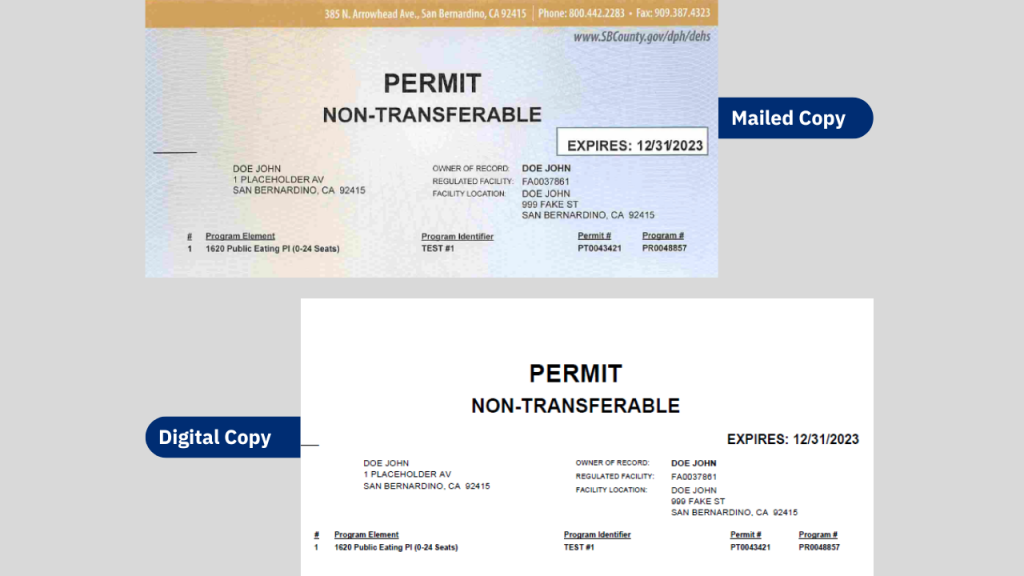
Many of us buy food, eat at restaurants, and enjoy the different types of cultural cuisines in our County. The California Retail Food Code is a portion of the California Health and Safety Code used by local agencies, industries, and consumers to ensure that the people who handle and sell food are following procedures and processes to keep our food safe from contamination.
The Retail Food Inspection Guide serves as a reference booklet and an educational tool for inspectors and food facility operators. This guide provides information on common terms used in the California Retail Food Code (Cal Code) and the San Bernardino County Code (SBCC) to assist in understanding violations. The California Code Official Inspection Report is used to document the violations observed in the facility and to calculate the final score/grade based on those violations. To view an example of the inspection report or to learn more about our food facility inspections, view the link below.

With your health permit from EHS, you receive two yearly inspections to make sure that your operation is following food safety procedures. By obtaining your health permit, you become a safe and responsible source of food for our County.

| Type | Name |
|---|---|
| Plan Review Application | |
| CMFO MFF Health Permit Application | |
| Mobile Food Facility Authorization for Use of Restroom Facilities | |
| Form A–Commissary–Commercial Kitchen Agreement for Facilities Located INSIDE San Bernardino County | |
| Form B-Commissary-Commercial Kitchen Agreement Facilities Located OUTSIDE San Bernardino County ONLY | |
| Form C–Mobile Food Facility Operating Schedule | |
| Mobile Food Facility Written Operational Procedures | |
| Veterans Exemption Form | |
| Preliminary Mobile Food Facility (MFF) Checklist |
| Type | Name |
|---|---|
| Build It Right – Mobile Food Facilities and Mobile Support Units | |
| Construction Guidelines for MFF Commissaries | |
| Approved Commissaries List | |
| Approved Commissaries List – Spanish | |
| What Permit Do I Need Flowchart | |
| Plan Check Timeline |
View the flowchart below to help you find out what health permit you need.
Once you have determined the health permit you need, complete the requirements for your food operation before you submit the health permit application.
Keep reading below to see details about each type of Mobile Food Facility (MFF) operation.
A food vehicle is a type of motorized, or nonmotorized conveyance towed by a motorized vehicle, usually occupied by a worker and is usually a truck or a trailer. Depending on the approved plans and health permit, extensive food preparation may be conducted. This type of operation has the most health and safety requirements including its own power source, mechanical refrigeration, and multiple sinks with hot and cold running water. It also allows for expanded food production and full preparation of food. This gives vendors the most options to selling or giving away food. (CalCode Chapter 10)
An approved plan from the Plan Check program, a valid health permit, an Authorization for Use of Restroom Form, and an approved commissary agreement are required for all food vehicles where food is prepared, or potentially hazardous food is being sold or given away. All of these must be obtained prior to operation.
Food Vehicle (Truck/Trailer) Resources| Type | Name |
|---|---|
| Food Truck Requirements | |
| Permit Types for Food Vehicle/Trailer |
Senate Bill 972 (SB 972) provides a new option known as the Compact Mobile Food Operation (CMFO) for mobile food facility street vendors. This is a specialized cart that requires a consultation with our Plan Check program, and a valid health permit where food is prepared, or potentially hazardous food is being sold or given away.
A Compact Mobile Food Operation (CMFO) is a mobile food facility that operates from a person or from a pushcart, stand, display, pedal-driven cart, wagon, showcase, rack, or other nonmotorized transport. CMFOs can conduct limited food preparation of nonpotentially hazardous and potentially hazardous food. Meat cannot be cooked from the raw state. Health and safety requirements will vary based on the menu and the type of operation. Multiple sinks and mechanical refrigeration may not be required. (CalCode Chapter 11.7)
An approved plan from the Plan Check program, a valid health permit, a Authorization for Use of Restroom Form, and an approved commissary agreement are required for all CMFOs where food is prepared, or potentially hazardous food is being sold or given away. All of these must be obtained prior to operation.
CMFO Applications| Type | Name |
|---|---|
| CMFO MFF Health Permit Application | |
| Cart/CMFO Permit Exempt Form |
| Type | Name |
|---|---|
| CMFO Risk Requirements | |
| CMFO Risk Requirements – Spanish | |
| Senate Bill 972 | |
| CMFO Guidelines | |
| CMFO Prepackaged Cart Operations | |
| CMFO Unpackaged Cart Operations | |
| CMFO FAQ | |
| What Permit Do I Need Flowchart | |
| Permit Exemption | |
| Plan Check Timeline |
A Standard Food Cart is a type of mobile food facility which is a nonmotorized transport. These carts can prepare food beyond the definition of limited food preparation. Meat can be cooked from the raw state. Health and safety requirements will vary based on the operation. Multiple sinks with hot and cold running water and mechanical refrigeration are usually required. (CalCode Chapter 10)
An approved plan from the Plan Check program, a valid health permit, a Authorization for Use of Restroom Form, and an approved commissary agreement are required for all CMFOs where food is prepared, or potentially hazardous food is being sold or given away. All of these must be obtained prior to operation.

Wholesale food facilities include:
Processors, warehouse/distribution centers, cold storage food facilities, food salvagers, food carts and food vehicle commissaries.
Wholesale Food Facilities ResourcesA Limited-Service Charitable Feeding Operations (LSCFOs) are charitable operations that provide small-scale/limited food preparation and serving, specifically to feed those in need. Prior to the passage of AB 2178, laws for LSCFOs required that these organizations apply for a full environmental health permit, pay annual fees and build their kitchens to the same standard as a restaurant commercial kitchen.
AB 2178 now allows these organizations to register and abide by the Best Management Practices (BMPs) of their major food bank partner (if they have one) or that of the Environmental Health Services (EHS) in lieu of an operating permit.
Did you know that in the United States 40% of food produced goes uneaten? That is 62.5 million tons of wasted food every year. Meanwhile, there were 42.2 million people, including 13.1 million children, who did not have enough food to lead a healthy, active lifestyle in 2015. While reducing hunger in the US will require addressing the root causes of poverty, donations of wholesome, fresh food can be an important strategy to addressing the immediate needs of millions of Americans.
You can help reduce food loss, and feed those in need by donating your surplus food. Donors are protected under the Federal Bill Emerson Good Samaritan Food Donation Act and the California Good Samaritan Food Donation Act (AB 1219).
The benefits of donating surplus food include, but are not limited to: Community investment and support, corporate image, tax incentives, reduced impact on local landfills, the environment, the planet, and strategy to meet state mandates such as AB 1826.
Volunteers and staff who handle food for charitable feeding operations are encouraged to take this Charitable Feeding Operations food safety training module. This free course is intended to train the public on how to keep food safe and prevent the spread of foodborne illness. Training is available in English and Spanish and the course is 22 minutes long. This module will not provide you with a Food Handler Card. Please refer to the Food Handler Training and Test to obtain an official Food Handler Card.
The purpose of this survey is to learn about current food recovery and food waste reduction efforts and struggles throughout San Bernardino County. Your establishment’s feedback will help us identify barriers and opportunities, and how Public Health can help.